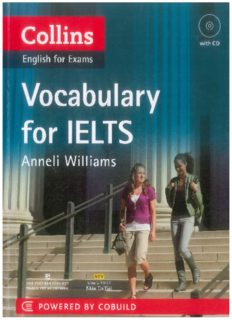Recent in Technology
Collins English for Exams Vocabulary for IELTS Anneli Williams
khan books
04:13
Vocabulary for IELTS Allows you to optimize your vocabulary as you study for the IELTS test. You may use the book to study the IELTS training courses on your own or as supplemental material. It is ideal for Level 5.0 to 5.5 learners looking for a band score of 6.0 or higher.
The Vocabulary for IELTS book and CD Include the appropriate vocabulary and skills for all four test papers: listening, reading, writing, and communicating. You are working in each unit against an exercise in test preparation based on the real IELTS test. Every unit involves exercises to help you learn the vocabulary awareness and skills, step by step, to help you handle the test. Exam suggestions in the book illustrate the important learning methods and review approaches relevant to vocabulary.
Part 2: Practice tests include a standardized series of exercises that can help you improve the skills to effectively utilize the skills of vocabulary to the test. each unit is based on learning a specific paper's vocabulary and skills, and the preparation exercises include instruction with a particular paper.
Part 3: Exam practice provides exam practice exercises in a format that follows the actual exam giving you the opportunity to familiarise yourself with the kinds of questions you will encounter in the exam. This section focuses on a particular exam paper and is highlighted in grey for easy reference.
For all parts of the text, including model answers for more open-ended writing and speaking activities, a detailed answer key is given. By reviewing the look at the most common collocations for the vocabulary related to the subject or function of each unit you will further improve the vocabulary at the back of the book.
The book is subdivided into 20 sections. Units 1-9 cover vocabulary for topics, such as health and education, that most often appear in the test. Units 11-19 contain terms that define general functions, such as solutions to problems. Units 10 and 20 have redesign activities. Unit 10 tests the vocabulary and qualifications addressed by Units 1-9, and Unit 20 tests the vocabulary and competencies covered by Units 11-19. Both 20 units help you improve abilities like paraphrasing and figuring out the meaning of unfamiliar descriptive terms. Each unit is self-contained, so the units can be analyzed in any order. You may select the unit you would like to learn either by choosing the topic you like to learn or by choosing which exam paper you would like to study. Only the units on the Speaking and Listening papers that have practice comprise audio. At the start of the book, the curriculum pages have a description of what's in each unit so you can use this to pick the units you'd like to review first. These pages also provide you with details on which units have audio in them. You would usually find it useful to start each unit by reading the vocabulary items in Section 1, then going through the activities at the end in training for the exercise of the test session. Continue to do the exercises within the specified time and allow yourself practical knowledge of the test. Typically it is appropriate to revisit it many times in order to understand a new word. The Units of Revision enable you to do this. But it's also a smart thing to stop writing the answers in the book so you can practice the tests later on. It's also suggested to keep a textbook on vocabulary. Knowing a word and how it should be used requires knowing certain aspects of it. The more details you are able to remember the vocabulary you are using, the more it will be helpful. Main definitions, speech parts, typical collocations, and sample sentences are all of the great support. To help with this, don't hesitate to use the Collocations portion at the back of the book. It will also be an asset to get well-informed feedback on your speaking and writing test practice activities. If this is not necessary, though, the tasks must also be completed in full. Studying answers to the model will help you improve the ability to understand your own work. Record yourself as you talk, and listen closely to your results where possible. Stop memorizing model answers. Clearly remember that it is necessary to answer the question in the actual exam and not just talk or write about the subject. You could re-read the test tips in the boxes as a final practice before the test. This will inform you of the Test performance methods.
Post Navi





Social Plugin